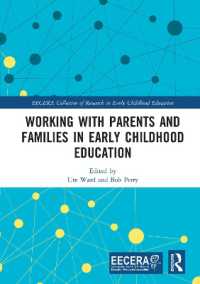Full Description
This book addresses urgent current debates on decolonisation by offering reimagined teaching and learning interventions for obtaining greater epistemic justice in the contemporary postcolonial university.
At a time when debates on decolonisation have gained urgency in academic, civic and public spaces, this interdisciplinary collection by authors based at the University of Cape Town, South Africa, serves as a valuable archive documenting and reflecting on a turbulent period in South African higher education. It is an important resource for academics looking to grasp debates on decoloniality both in South Africa, and in university and teaching spaces further afield. Calling for concerted and collaborative work towards greater epistemic justice across diverse disciplines, the book puts forward a new vision of the postcolonial university as one that enables excellent teaching and learning, undertaken in a spirit of critical consciousness and reciprocity.
Contents
Introduction Epistemic Justice and the University of Cape Town: Thinking Across Disciplines - Ruchi Chaturvedi, Shari Daya and Amrita Pande
Part I: Aesthetics, Politics and Languages
Chapter 1 Ukuhamba Ukubona/Travelling to Know: Mobility as Counter-Curriculum Across Africa - Nomusa Makhubu
Chapter 2 Publics, Politics, Place and Pedagogy in Urban Studies - Rike Sitas
Chapter 3 Imagining Southern Cities: Reflections on an Interdisciplinary Pedagogical Space - Shari Daya and Rike Sitas
Chapter 4 Invoking Names: Finding Black Women's Lost Narratives in the Classroom - Athambile Masola
Part II: Justice, Curriculum and the Classroom
Chapter 5 Decolonising Psychology in Africa: The Curriculum as Weapon - Shose Kessi and Hal Cooper
Chapter 6 The Shards Haven't Settled: Contesting Hierarchies of (Teaching) History - Koni Benson and Kerusha Govender
Chapter 7 Heavy-handed Policing: Teaching Law and Practice to LLB Students in South Africa - Jameelah Omar
Part III: Contested Histories and Ethical Spaces
Chapter 8 African Studies at UCT: An Interview with Lungisile Ntsebeza - Sepideh Azari
Chapter 9 The African Gender Institute: A Journey of Place-making - Kealeboga Mase Ramaru
Chapter 10 The Ethic of Reconciliation and a New Curriculum - Ari Sitas
Afterword - Amrita Pande, Ruchi Chaturvedi, Shari Daya








